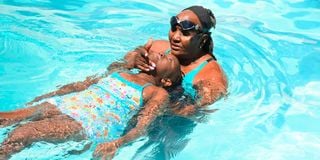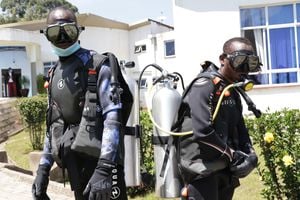
Sally Njeri, a diver and swimming instructor from Nakuru County, trains a young girl to swim in a pool at Hill Court Hotel.
At 64, Sally Njeri, a professional diver from Rongai in Nakuru County, is challenging conventional expectations and breaking gender stereotypes in a predominantly male-dominated field by dedicating her time to retrieving bodies from water bodies.
The mother of one and grandmother of two has more than 35 years' experience in training and lifesaving in rivers, dams, lakes and swimming pools, making her one of the few seasoned lifesavers in Kenya.
She is often called upon to help during water disasters in Nakuru.
"I learnt to swim when I was a little girl, about three years old. I had my first swimming competition at Hospital Hill Primary School in Nairobi at the age of five. That was the beginning of my swimming career," Njeri said in an interview when Nation caught up with her recently.
Her early successes in swimming competitions led to her active participation in lifesaving lessons in sixth grade.

Sally Njeri Ndiri shows some life-saving skills to a pupil at Shah Lalji Nangpar Academy Nakuru in this photo taken on September 17, 2021.
During this time, she learned essential skills such as pulling a drowning person to safety and cardiopulmonary resuscitation (CPR).
Njeri then underwent various professional training programmes, including Fina (International Swimming Federation) for competitive techniques and the ILS (International Lifesaving Federation) programme known as Future Lifeguards.
Her introduction to actual rescue missions came when her friend's cousin drowned in a dam near Egerton University in Njoro Sub-county.
Working with another diver and university students, they successfully retrieved the body from the deep and murky dam.
That experience marked the beginning of her extensive involvement in retrieving bodies, a task she has carried out in Nakuru and other parts of the country, including the Molo River.
"My friend knew I was a diver and she called me crying for help. It took longer than expected, but all that motivated me was the smile on her face as I dived in and came out with the body," she recalls.
Njeri shared valuable insights into the challenges and precautions involved in her work, underscoring the importance of caution when entering water bodies.
While acknowledging the risks of her job, from unsafe underwater conditions to potential exposure to disease, she says divers must avoid soft areas due to mud, lie down instead of walking, and pray before each retrieval as anything can go wrong underwater.

Sally Njeri, a diver and swimming instructor from Nakuru County, displays some of the medals she has won in various competitions.
According to her, an initial assessment of the scene and identification of potential dangers are crucial steps before embarking on a recovery mission.
She explained the technique of using a stick as a guide to detect the presence of a body underwater.
"In rivers, where the water speed varies, it is important to measure the current with sticks to navigate safely. It is a scary job because you are not sure what is there, what is underneath. Personally, whenever I am called upon, I always pray to God first to guide and lead me to recover the body so that the family can have peace," she said.

Sally Njeri, a diver and swimming instructor from Nakuru County, displays her skills as she dives in a pool at Hill Court Hotel.
One of the highlights of her career was the Lake Nakuru helicopter crash recovery operation in October 2017.
Designated as the lead diver, she coordinated efforts with a team of divers from the Kenya Defence Forces (Kenya Navy), Kenya Lifesaving Divers and others.
And despite challenging conditions and the presence of sewage in the lake, the team managed to retrieve three bodies after 41 days of searching.
"Being able to tell others what to do was a humbling experience. That was when I learnt what diving is all about. It taught me a few things, among them that you don't just go in. You have to search first and know what you are going for," she said.

Sally Njeri, a diver and swimming instructor from Nakuru County, shows off her skills in a pool at Hill Court Hotel.
Speaking about the scepticism she faces as a woman in her field, Njeri recounted an incident in Bahati where the community doubted her ability during a retrieval mission.
But she proved her expertise and they later apologised for underestimating her.
"They asked why they had brought an old woman to do the job. I delivered beyond their expectations. They called later and apologised for undermining me," she said.
In the interview, she stressed the need for recognition of divers and called on the government to recognise their role in saving lives and retrieving bodies. Njeri also urged people, especially in rural areas, to learn to swim to prevent drowning.
"More girls and women should take up swimming and lifesaving as a career. It is not a preserve for men," she urged.







